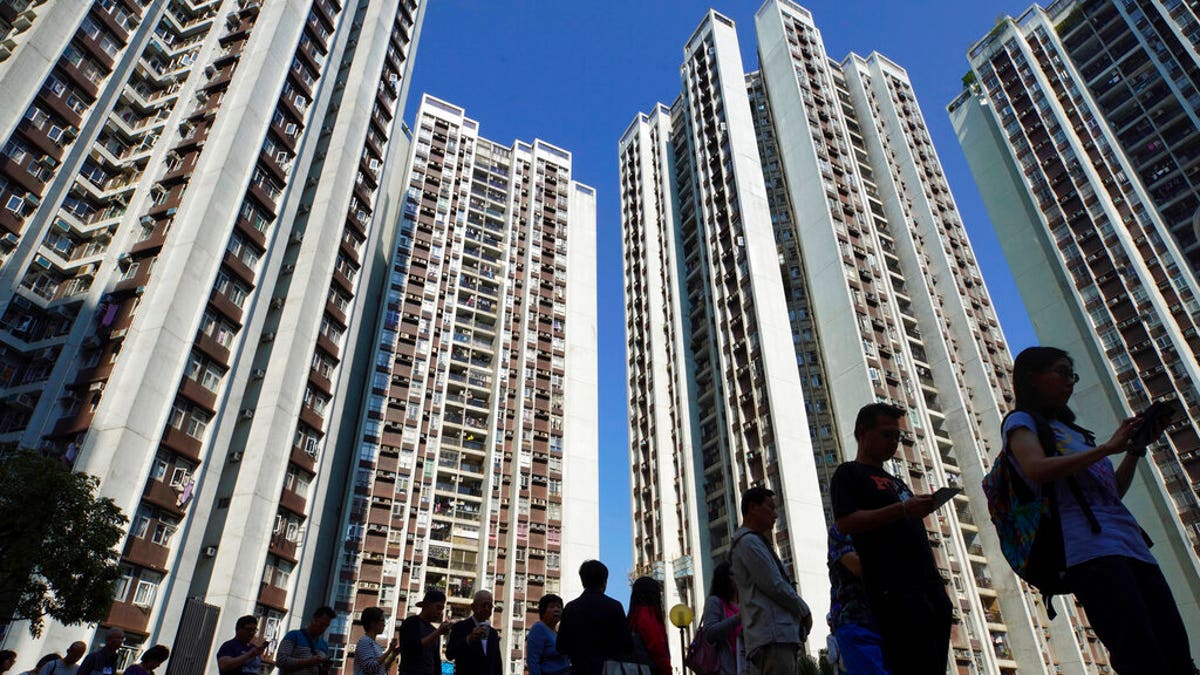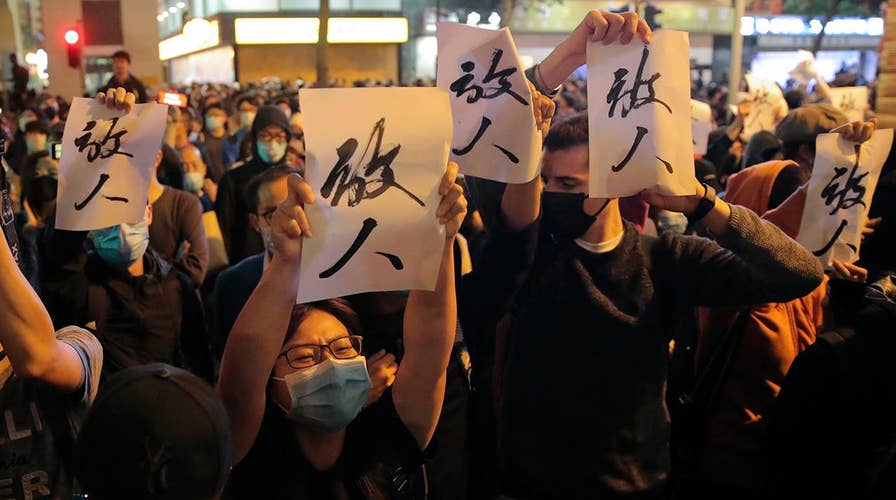Anti-government protestors prevailed on Sunday after polls closed in Hong Kong and pro-democracy candidates clinched nearly half of the seats on the ballot.
So far, pro-democracy candidates have won 269 out of 452 seats in 18 district council races, while pro-Beijing forces, who previously held 73 percent of the seats, have only won 30. Voters came out in droves -- with a 71 percent turnout -- up from 47 percent four years ago in the same elections, according to the Electoral Affairs Commission.
"This is political annihilation for Beijing and it's going to have consequences that are going to reverberate not just in Hong Kong itself, but perhaps in China as well," Asia analyst and foreign affairs journalist Gordon Chang said on Fox News' "America's News HQ" Sunday.

Supporters cheering after a pro-democracy candidate won a seat in district council elections in Hong Kong, early Monday. (AP Photo/Vincent Yu)
HELEN RALEIGH: US MUST STAND WITH HONG KONG FREEDOM FIGHTERS
The history-making victory for pro-democracy candidates in the elections marked a win in what has largely been seen as a referendum on the protest movement and China’s response to it.
Months of violent protests ravaged the city as demonstrators smashed storefronts of pro-nationalist businesses, lit toll booths on fire, shut down a major tunnel and engaged in battles with police, countering tear gas and water cannons with torrents of gasoline bombs, which resulted in more than 5,000 arrests.
Protests first erupted this past June after the government introduced an extradition bill that would send criminal suspects for trials to mainland China. That bill has now been abandoned, but the movement since expanded to include demands for democratic elections for the city’s leader and legislature, and an independent probe into alleged police brutality in suppressing the protests.
Pro-Beijing leaders said they hoped the violence would detract from the democracy cause but voting remained peaceful amid tight security at the ballot boxes and long wrap-around lines at polling stations.

Long lines formed outside Hong Kong polling stations Sunday in elections seen as a barometer of public support for anti-government protests now in their sixth month. (AP Photo/Vincent Yu)
The mounting pro-democracy victories will likely put intense pressure on Hong Kong’s leader to resign and on the Chinese government to confront the policy demands of protestors, analysts noted.
"Carrie Lam, the Hong Kong chief executive, she reports directly to Xi Jinping. She no longer has any freedom of action," Chang said. "If he tells her not to give ground, which is what he's been doing for the last several months, then you're going to see Hong Kong erupt because, you know, people have expressed their will."
"If the political establishment doesn't make concessions, then we don't know where this will go, but we know that will become probably much more violent and the protests will become even larger," he added.
Among the winners were former student leaders and a candidate who replaced prominent activist Joshua Wong, the only person barred from running in the election. Rally organizer Jimmy Sham, who suffered a beating by hammer-wielding attackers last month, also triumphed, as did a pro-democracy lawmaker who had part of his ear bitten off by an assailant.

Pro-democracy candidate James Yu hugging his girlfriend after winning his seat in district council elections in Hong Kong, early Monday. (AP Photo/Vincent Yu)
Hong Kong’s largest pro-Beijing political party suffered the biggest setback, with more than 100 of its 182 candidates defeated. Among the losing incumbents was controversial lawmaker Junius Ho, who was stabbed with a knife while campaigning this month.

Pro-democracy supporters celebrating after pro-Beijing politician Junius Ho lost his election in Hong Kong, early Monday. (AP Photo/Kin Cheung)
President Trump expressed concern about the possible repercussions that the Hong Kong elections could have on an impending trade deal with China, in a "Fox & Friends" interview late last week.
"We have to stand with Hong Kong, but I'm also standing with President Xi," Trump said. "He's a friend of mine... I stand with Hong Kong. I stand with freedom. I stand with all the things that we want to do but we also are in the process of making the largest trade deal in history."
The House and Senate, with overwhelming support, have passed a bill to protect the protestors that have violently canvassed the streets for months but the president has not said whether he will sign that bipartisan legislation.
Chang said Trump's tempered approach towards China in regards to the elections "is not going to work."
HONG KONG PROTESTERS' FAMILIES FEAR UNIVERSITY SHOWDOWN COULD SPARK 'TIANANMEN 2.0'
"His approach is consistent with four decades of American policy, whereas basically you don't anger Chinese leaders because we think we need their goodwill," Chang said of Trump.
"The Chinese have been stalling on the trade deal because they think that while they'll stall, Trump won't go after them on things like Hong Kong. So they think they're getting the best of both possible worlds... if you want a trade deal, you've got to go after the Chinese."
CLICK HERE TO GET THE FOX NEWS APP
Chang suggested that the remedy to securing a trade deal would be to continue raising tariffs while simultaneously condemning Chinese human rights abuses and allegations of corruption.
"Increase those tariffs to the point where China just no longer is able to continue without access to the U.S. market because those tariffs are cutting off China's ability to sell products in the U.S. We need to raise those tariffs so that China then has understands it has no choice but to stop stealing our intellectual property. Stop trade violations, stop all this stuff we don't want them to do," Chang said.
Fox News' Jonathan Hunt in Hong Kong, Arthel Neville and The Associated Press contributed to this report.









































